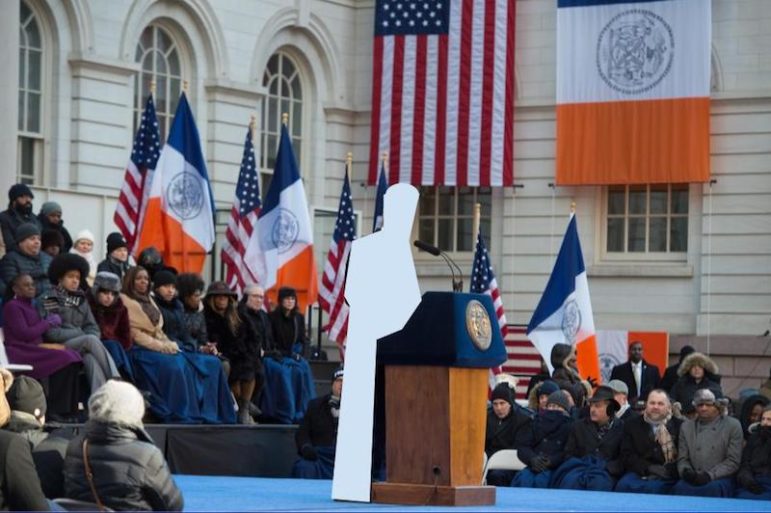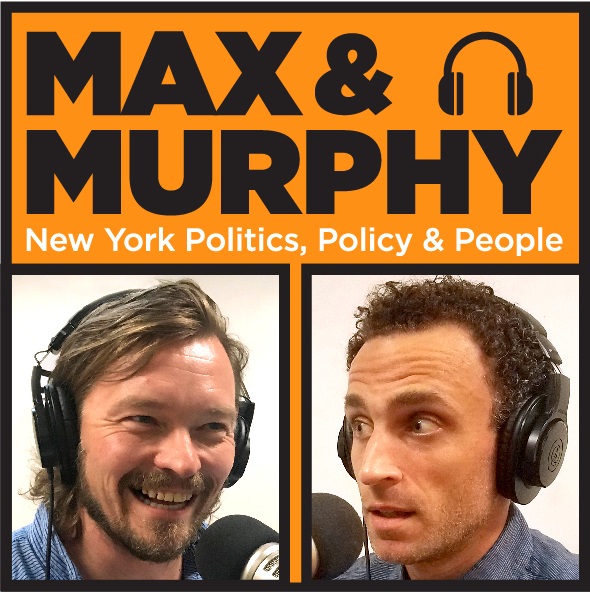
Mayoral Photography Office/City Limits
Who will take the oath at City Hall on January 1, 2022? The answer could come faster than you expect.A year from now, New York City will likely know its next mayor. The tallies from the June 22, 2021 primary election will still be getting tallied, and the possibility of a strong Republican or Independent candidacy will certainly make the November general election meaningful. Chances are, however, that the person who prevails in the Democratic primary will make it to City Hall.
Especially with the presidential race occupying more of the spotlight between now and November, that means Scott Stringer, Corey Johnson, Eric Adams, Dianne Morales, Loree Sutton and Shaun Donovan—the Democrats who’ve announced they are running—have to start making their case to voters very soon.
Unequivocally, the recent events, twin events of covid and the protests have unquestionably scrambled things – not necessarily I don’t think the dynamics between the candidates, but I think what each candidate is going to need to now do to meet the moment, because we are in a very different moment,” Neal Kwatra, the founder of Metropolitan Strategies, told WBAI’s Max & Murphy Show on Wednesday. “People are paying attention, people are on the streets, people are researching people’s records and where they were on issues, not just in the last six weeks but in the last six years. All of that is still yet to shake out.”
The tight timetable doesn’t mean the list of known candidates—which already shrunk when Ruben Diaz Jr. pulled out of the race—cannot grow. Veteran strategist Rebecca Katz, who worked on the Jamaal Bowman campaign that appears to have ousted Rep. Eliot Engel in Tuesday’s primaries, noted the potential for late entries and sudden surges. “If you look at the Bowman race last night, six weeks out, people weren’t even giving him a shot. You never know what can happen,” she said, recalling that in the 2013 mayoral race, “de Blasio didn’t surge till the end.”
What is known is that candidates are operating amid a pandemic, a fiscal crisis and an unprecedented public reckoning over race and criminal justice.
“The conversation can’t just stop at police reform and accountability. All of these issues of systemic racism course through every aspect of public life from housing to education, to taxes to Medicaid. For crying out loud, we’re in the middle of a pandemic and we have the State of New York continuing to cut Medicaid,” Kwatra noted. “In the State of New York, 37 percent of every non-elderly African American, is on Medicaid, when you cut Medicaid, you’re cutting healthcare for African Americans in the State of New York, period, end of story. These are conversations we have to have through that lens in this moment.”
The presence of a multifaceted crisis and the failures of the current mayor to respond to it capably mean that managerial chops will be important as voters select the next city leader, Kwatra added. But Katz believes that candidates would make a strategic error if they equated competence with caution, or built their campaign solely around a critique of de Blasio. Bold ideas are what the voters want, because they are what the city needs, she argued.
“I think the new New York City mayor is going to be talking about how to provide more housing, better schools, figuring out jobs, figuring out universal basic income at this point, something radical that helps keep the New York City economy afloat,” Katz said. “I remember in 2013, everyone kept going towards the center and speaking to that centrist middle-class pragmatism like Quinn and Thompson whereas de Blasio was talking about poor people and you know what, there’s going to be a lot more people needing a lot more than they did in 2013.”
Three of the mayoral hopefuls currently in the field hold public office, and don’t need to wait until becoming mayor to take bold steps. Two of them—City Comptroller Stringer and Council Speaker Johnson—have the power to make significant policy moves themselves right now. Adams, as borough president, is somewhat more constrained, but all the candidates (including nonprofit executive Morales, former city veterans commissioner Sutton, and one-time Bloomberg and Obama administration official Donovan) can start outlining their visions now, and in a very concrete way.
New York’s one million public-school kids and their parents are waiting to hear what school will look like in the first post-COVID September, Katz noted. While the current mayor sorts it out, maybe the next one will step up to say how they’d set it up.
Hear our conversation, including a discussion of the preliminary results from Tuesday’s primaries, below.
With reporting by Ben Max and Anika Chowdhury.










One thought on “Mayoral Hopefuls Have a Narrow Window for Bold Moves”
Stringer appears to be most sensible of the lot, the lesser of the inept evils.